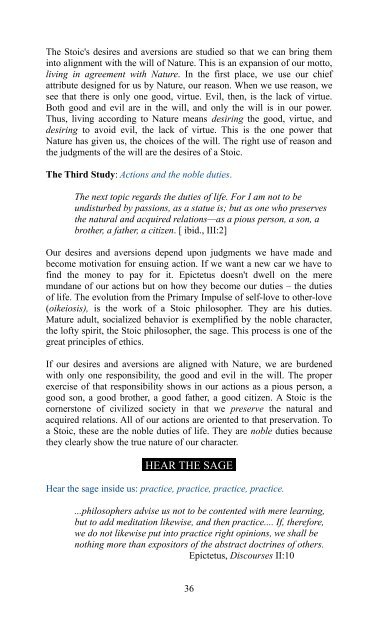The Stoic HANDBOOK - College of Stoic Philosophers
The Stoic HANDBOOK - College of Stoic Philosophers
The Stoic HANDBOOK - College of Stoic Philosophers
You also want an ePaper? Increase the reach of your titles
YUMPU automatically turns print PDFs into web optimized ePapers that Google loves.
<strong>The</strong> <strong>Stoic</strong>'s desires and aversions are studied so that we can bring them<br />
into alignment with the will <strong>of</strong> Nature. This is an expansion <strong>of</strong> our motto,<br />
living in agreement with Nature. In the first place, we use our chief<br />
attribute designed for us by Nature, our reason. When we use reason, we<br />
see that there is only one good, virtue. Evil, then, is the lack <strong>of</strong> virtue.<br />
Both good and evil are in the will, and only the will is in our power.<br />
Thus, living according to Nature means desiring the good, virtue, and<br />
desiring to avoid evil, the lack <strong>of</strong> virtue. This is the one power that<br />
Nature has given us, the choices <strong>of</strong> the will. <strong>The</strong> right use <strong>of</strong> reason and<br />
the judgments <strong>of</strong> the will are the desires <strong>of</strong> a <strong>Stoic</strong>.<br />
<strong>The</strong> Third Study: Actions and the noble duties.<br />
<strong>The</strong> next topic regards the duties <strong>of</strong> life. For I am not to be<br />
undisturbed by passions, as a statue is; but as one who preserves<br />
the natural and acquired relations—as a pious person, a son, a<br />
brother, a father, a citizen. [ ibid., III:2]<br />
Our desires and aversions depend upon judgments we have made and<br />
become motivation for ensuing action. If we want a new car we have to<br />
find the money to pay for it. Epictetus doesn't dwell on the mere<br />
mundane <strong>of</strong> our actions but on how they become our duties – the duties<br />
<strong>of</strong> life. <strong>The</strong> evolution from the Primary Impulse <strong>of</strong> self-love to other-love<br />
(oikeiosis), is the work <strong>of</strong> a <strong>Stoic</strong> philosopher. <strong>The</strong>y are his duties.<br />
Mature adult, socialized behavior is exemplified by the noble character,<br />
the l<strong>of</strong>ty spirit, the <strong>Stoic</strong> philosopher, the sage. This process is one <strong>of</strong> the<br />
great principles <strong>of</strong> ethics.<br />
If our desires and aversions are aligned with Nature, we are burdened<br />
with only one responsibility, the good and evil in the will. <strong>The</strong> proper<br />
exercise <strong>of</strong> that responsibility shows in our actions as a pious person, a<br />
good son, a good brother, a good father, a good citizen. A <strong>Stoic</strong> is the<br />
cornerstone <strong>of</strong> civilized society in that we preserve the natural and<br />
acquired relations. All <strong>of</strong> our actions are oriented to that preservation. To<br />
a <strong>Stoic</strong>, these are the noble duties <strong>of</strong> life. <strong>The</strong>y are noble duties because<br />
they clearly show the true nature <strong>of</strong> our character.<br />
HEAR THE SAGE<br />
Hear the sage inside us: practice, practice, practice, practice.<br />
...philosophers advise us not to be contented with mere learning,<br />
but to add meditation likewise, and then practice.... If, therefore,<br />
we do not likewise put into practice right opinions, we shall be<br />
nothing more than expositors <strong>of</strong> the abstract doctrines <strong>of</strong> others.<br />
Epictetus, Discourses II:10<br />
36

















